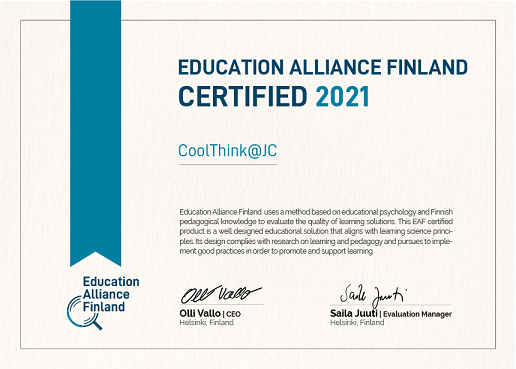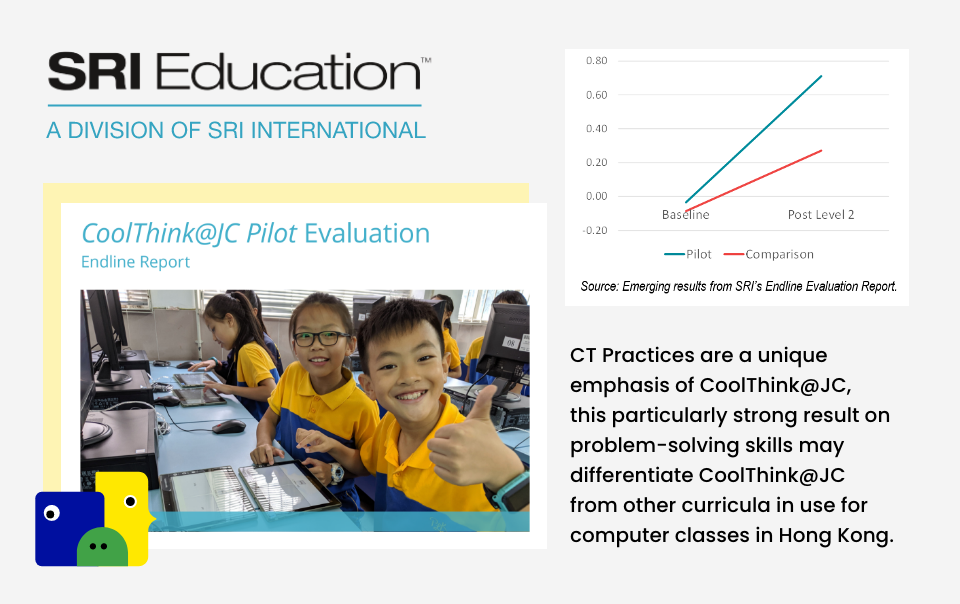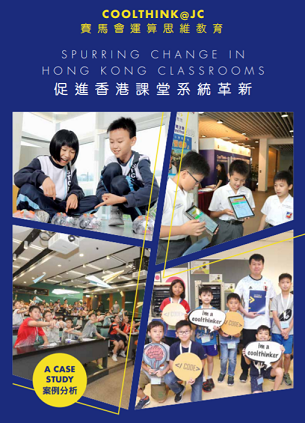We invest in developing the evidence base on computational thinking education and technology education, translate research findings into best practices to inform our key stakeholders and ecosystems. We develop high quality, age-aligned curriculum and learning materials match with global standard and recognition.

CoolThink@JC curriculum certified by Education Alliance Finland (Jan 2022)
Benchmarked to UK National Computing Curriculum, EAF evaluation reported that CoolThink@JC represents “high education quality and is proved to promote learning efficiently … a very comprehensive and progressive program for learning computational thinking and programming … supports creativity and exploration, yet provides accurately predictable learning outcomes”.

CoolThink@JC awarded the ISTE Seal of Alignment standard by the International Society for Technology Education (Aug 2021)
Selected through a rigorous professional review process, CoolThink@JC’s curriculum has been verified as contributing to the pedagogically robust use of technology for teaching and learning, while meeting the critical elements of standard indicators for students.
In particular, we obtained full scores in two of the standards, namely “Computational Thinker” and “Innovative Designer”.

CoolThink@JC Pilot Independent Evaluation Report (2020)
Stanford Research Institute (SRI) has conducted a rigorous 3-year evaluation of the CoolThink pilot project between 2016 and 2019 and the progress made by its students. The report describes outcomes of the initiative for students, as well as the experiences of teachers and other participants, and offers a set of implications for other stakeholders who wish to build on the pilot’s successes and lessons.
On average, pilot students gained 2.1 times as much as students in comparison schools in CT Practices.
Building on the pilot’s success, SRI will continue to evaluate the “How” and “Why” of the implementation of CoolThink@JC as it plans to scale out and reach a large majority of primary schools in Hong Kong.

CoolThink@JC Case Study – Spurring Change in Hong Kong Classrooms (Dec 2020)
In early 2016, The Hong Kong Jockey Club Charities Trust took a proactive approach by funding a four-year, HK$216 million pilot project, CoolThink@JC, to introduce computational thinking into a broad sample of schools citywide at upper primary level and thus provide a body of evidence and experience to stimulate longer-term discussion and reform. The Trust believes that the lessons it has learned as not only a funder of the project, but also a proactive steward of it, can provide policymakers, community leaders and other philanthropists with some useful insights on how to design and manage a project of this ambition and scale. This case study is therefore intended to share the Trust’s learning from the initiative.

A Case Study by the University of Chicago Booth School of Business
Robert H. Gertner and James Carmichael (2018) published a case study on CoolThink@JC to be used in the school of business.
Contact us at coolthink@hkjc.org.hk for more …
Articles
The 5th ‘C’ of 21st Century Skills? Try Computational Thinking (Not Coding)
Shuchi Grover (2018)
For better or worse, computing is pervasive, changing how and where people work, collaborate, communicate, shop, eat, travel, learn and quite simply, live. From the arts to sciences and politics, no field has been untouched.…
After the reboot: computing education in UK schools
The Royal Society (2017)
This Royal Society report, After the Reboot – Computing Education in UK Schools, explores the challenges and issues facing the subject in primary and secondary schools since the subject was introduced in English schools in 2014….
Computational Thinking: I Do Not Think It Means What You Think It Means
Lorena Barba (2016)
“It’s a basic skill. Right along with the three Rs.” President Obama, on his weekly address just over a month ago, announced the $4-billion Computer Science for All initiative. Reactions quickly spread to make clear that…
What’s the Difference Between Coding and Computational Thinking?
Sheena Vaidyanathan (2016)
In my last EdSurge article, “Computer Science Goes Beyond Coding,” I wrote about the difference between coding and computer science, to help us understand what we mean by phrases like “Teach kids to code” and …
Computational thinking, 10 years later
Jeannette M. Wing (2016)
We have made tremendous progress in injecting computational thinking into research and education of all fields in the last ten years. We still have a ways to go, but fortunately, academia, industry and government forces are aligned toward realizing the vision of making computational thinking commonplace.
A Different Approach to Coding
Mitchel Resnick & David Siegel (2015)
For us, coding is not a set of technical skills but a new type of literacy and personal expression, valuable for everyone, much like learning to write. We see coding as a new way for people to organize, express, and share their ideas.
Report of a workshop on the scope and nature of computational thinking
Hal Abelson (2010)
As the use of computational devices has become widespread, there is a need to understand the scope and impact of what is sometimes called the Information Revolution or the Age of Digital Information. This is particularly apparent in education at all levels…
Papers and Books
A principled approach to designing computational thinking concepts and practices assessments for upper elementary grades
Satabdi Basu, Daisy W. Rutstein, Yuning Xu,Haiwen Wang & Linda Shear (2021)
In today’s increasingly digital world, it is critical that all students learn to think computationally from an early age. Assessments of Computational Thinking (CT) are essential for capturing information about student learning and challenges. When programming is used as a vehicle to foster CT skills, assessment of CT skills needs to measure understanding of programming concepts alongside general problem-solving practices applicable in contexts beyond programming.…
Computational Thinking Education
Siu-Cheung Kong & Harold Abelson (2019)
This book offers a comprehensive guide, covering every important aspect of computational thinking education. It provides an in-depth discussion of computational thinking, including the notion of perceiving computational thinking practices as ways of mapping models from the abstraction of data and process structures to natural phenomena. Further, it explores how computational thinking education is implemented in different regions, and how computational thinking is being integrated into subject learning in K-12 education. In closing, it discusses computational thinking from the perspective of STEM education, the use of video games to teach computational thinking, and how computational thinking is helping to transform the quality of the workforce in the textile and apparel industry.…
International Conference on Computational Thinking Education 2019
Conference Proceedings
CTE2019 is organized along with a coding fair to welcome enthusiastic family. Through a series of coding workshops and booth exhibition by pilot schools, participants will get a taste of computational thinking education. The parent seminars, with the theme “Code, Music and Sports”, include sharing from influencers who excel to incorporate coding in their expertise.
International Conference on Computational Thinking Education 2018
Conference Proceedings
“Computational Thinking Education” is the main theme of CTE2018 which aims to keep abreast of the latest development of how to facilitate students’ CT abilities, and disseminate findings and outcomes on the implementation of CT development in school education. CTE2018 gathers educators and researchers around the world to share implementation practices and disseminate research findings on the systematical teaching of computational thinking and coding across different educational settings.
International Conference on Computational Thinking Education 2017
Conference Proceedings
“Computational Thinking Education” is the main theme of CTE2017 which aims to keep abreast of the latest development of how to facilitate students’ CT abilities, and disseminate findings and outcomes on the implementation of CT development in school education. It comprises keynote and invited speeches by internationally renowned scholars, panel discussions, academic paper presentation, booth exhibition on STEM/Coding products and solutions, and student and teacher poster presentation and demonstration.
New frameworks for studying and assessing the development of computational thinking
Brennan & Resnick (2012)
Computational thinking is a phrase that has received considerable attention over the past several years – but there is little agreement about what computational thinking encompasses, and …
Computational Thinking
Jeannette M. Wing (2006)
Computational thinking builds on the power and limits of computing processes, whether they are executed by a human or by a machine. Computational methods and models give us the courage to solve problems and design systems …
Mindstorms: Children, Computers, and Powerful Ideas
Seymour Papert (1980)
Just a few years ago people thought of computers as expensive and exotic devices. Their commercial and industrial uses affected ordinary people, but hardly anyone expected computers to become part of day-to-day life. This view has changed dramatically and rapidly as the public has come to accept the reality of the personal computer, small and inexpensive enough to take its place in every living room or even in every breast pocket…



